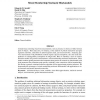Free Online Productivity Tools
i2Speak
i2Symbol
i2OCR
iTex2Img
iWeb2Print
iWeb2Shot
i2Type
iPdf2Split
iPdf2Merge
i2Bopomofo
i2Arabic
i2Style
i2Image
i2PDF
iLatex2Rtf
Sci2ools
111
click to vote
NIPS
2008
2008
Mixed Membership Stochastic Blockmodels
Consider data consisting of pairwise measurements, such as presence or absence of links between pairs of objects. These data arise, for instance, in the analysis of protein interactions and gene regulatory networks, collections of author-recipient email, and social networks. Analyzing pairwise measurements with probabilistic models requires special assumptions, since the usual independence or exchangeability assumptions no longer hold. Here we introduce a class of variance allocation models for pairwise measurements: mixed membership stochastic blockmodels. These models combine global parameters that instantiate dense patches of connectivity (blockmodel) with local parameters that instantiate node-specific variability in the connections (mixed membership). We develop a general variational inference algorithm for fast approximate posterior inference. We demonstrate the advantages of mixed membership stochastic blockmodels with applications to social networks and protein interaction net...
Information Technology | Membership Stochastic Blockmodels | Mixed Membership | NIPS 2008 | Pairwise Measurements |
Related Content
| Added | 30 Oct 2010 |
| Updated | 30 Oct 2010 |
| Type | Conference |
| Year | 2008 |
| Where | NIPS |
| Authors | Edoardo Airoldi, David M. Blei, Stephen E. Fienberg, Eric P. Xing |
Comments (0)

